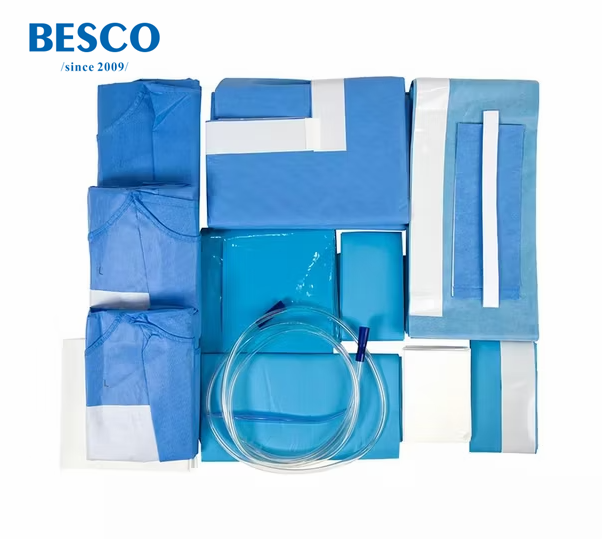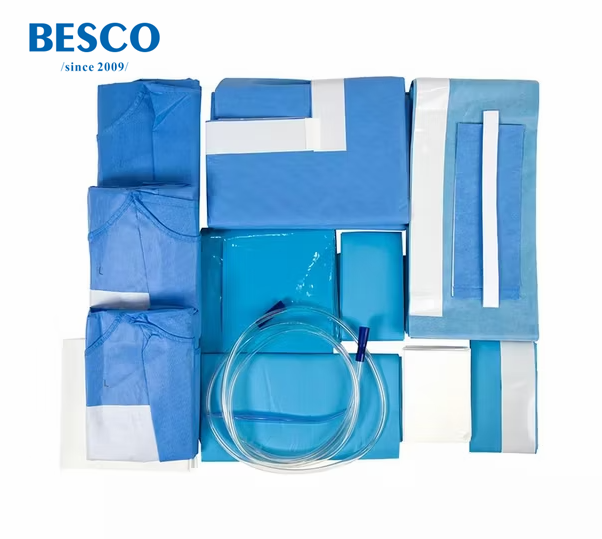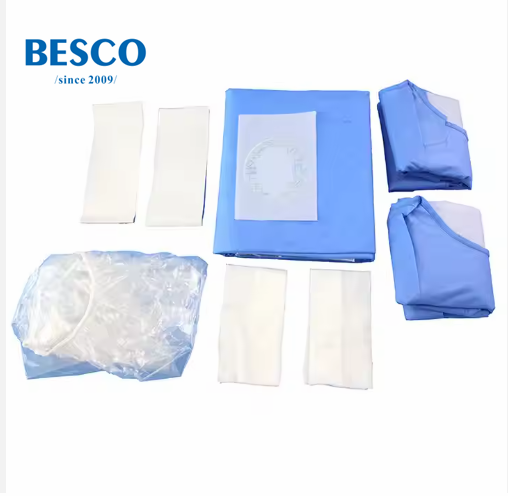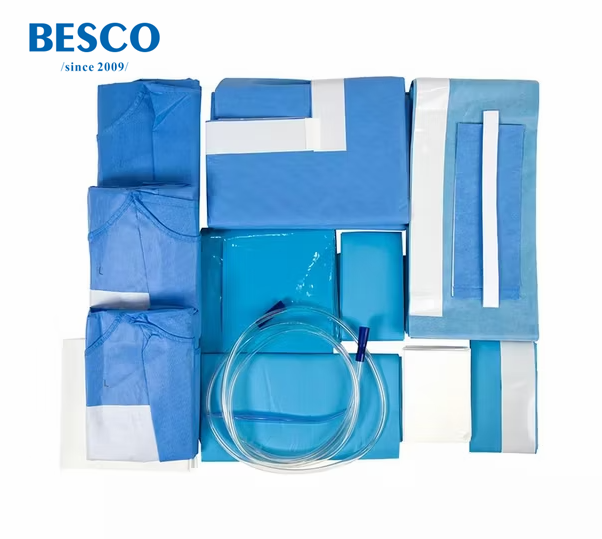| Name: | Reignforced Angio Surgical Packs |
|---|---|
| Product Name: | Reinforced Angiography Surgical Packs |
| Material: | SMS |
| Brand: | BESCO |
| Keywords: | Angio Packs,Angio Surgical Packs,Custom Reinforced Angiography Surgical Packs |
| MOQ: | 500 packs |
| Price: | US18.95 |
| Lead time: | 7 days |
| SAMPLES: | Available |
| Payment Term: | T/T in advance |
| Country of Original: | China |
| Stock: | Available |
| Factory Address: | Changyuan,China |
| Office: | Zhengzhou,China |
Products Description
Reinforced Angiography Surgical Packs
Specifications and Contents:
Manifold Set | Size | 1 |
Guidewire | 0.035*150cm | 1 |
Fluoroscopy cover | 90cm | 1 |
Fluoroscopy cover | 80*120cm | 1 |
( 4 hole) Angiography drape | 240*320cm | 1 |
Introducer Needle | 18G*7cm | 1 |
High pressure tube | 30cm | 1 |
Back table cover | 150*190cm | 1 |
Hand Towels | 30*40cm | 2 |
Luer Lock IV set | 1 | |
Pressure Monitoring line | 150cm | 1 |
Angio Syring | 1 |

An Angio Surgical Packs provides optimal fluid management and sterility during an angiographic procedure.The drapes and accessories included in this set facilitate catheterization and imaging,thus improving patient safety and performance.
Angiography surgical packs contain essential tools and materials used during angiographic procedures, which involve imaging blood vessels.
Contents of Angiography Surgical Packs:
Instruments:
Catheters
Guidewires
Sheaths
Introducers
Supplies:
Sterile drapes
Gauze pads
Adhesive bandages
Antiseptic solutions
Purpose: These packs are designed to streamline the preparation and execution of angiography, ensuring that all necessary items are readily available and sterile.
Usage: Angiography packs are utilized in various settings, including hospitals and outpatient clinics, primarily for diagnostic and interventional procedures related to cardiovascular health.
How to use the angio surgical packs?
To use an angio surgical pack, a qualified medical professional opens the sterile packaging, maintains aseptic technique, and uses the included sterile instruments and drapes to perform an angiography procedure under the supervision of an interventional cardiologist. The process involves preparing the patient's insertion site, flushing the kit with a heparinized saline solution, draping the patient to create a sterile field, and using the pack's components to facilitate the catheterization and diagnostic imaging of blood vessels to locate blockages or other issues.
1. Preparation and Sterile Technique
Verify Contents: Ensure all items are present and the packaging is intact.
Aseptic Technique: Maintain strict aseptic technique to prevent contamination throughout the entire procedure.
Draping: Place the sterile drapes according to the patient's anatomy and the procedure's requirements to create a sterile field.
2. Procedure Steps
Flush the Kit:
Flush the components of the angio pack with a heparinized saline solution to ensure sterility and proper function.
Site Preparation:
Clean, shave, and numb the chosen insertion site (e.g., the groin or wrist) with a local anesthetic.
Insert Catheter:
Under the supervision of an interventional cardiologist, a guide wire and then the catheter are inserted through the access site into the target vessel.
Imaging:
A special iodine dye is injected to enhance the visibility of the arteries under real-time X-ray (fluoroscopy) to identify any blockages or other issues.
Intervention (if needed):
If a blockage is found, a balloon may be used to expand the artery, and a stent (a wire mesh tube) might be placed to keep the artery open.
3. Completion and Post-Procedure
Remove Equipment:
Once the diagnostic or interventional procedure is complete, all equipment, including the catheter, guide wire, and the angio pack, are removed from the patient's body.
Secure Access Site:
Pressure is applied to the insertion site to stop any bleeding, and the site is then covered with a sterile dressing.
Aftercare:
The patient may require bed rest for several hours and can use ice packs to manage pain and swelling.
Who Uses Angio Packs
These packs are designed for use by qualified medical or paramedical staff, such as cardiologists and interventional radiologists.





